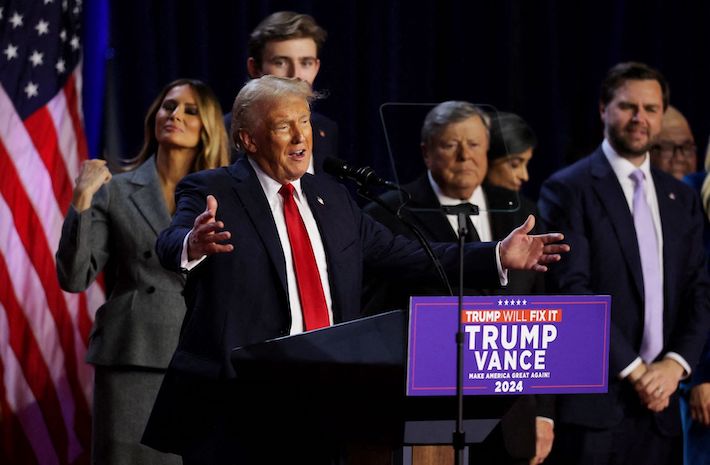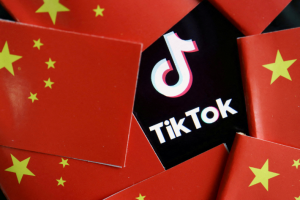With Donald Trump claiming victory in the US presidential election, China is getting ready for another four years of rivalry over trade, technology and security issues.
Republican Party candidate Trump appears to have won a bigger share of the vote nationwide than he did four years ago, according to counts at the time of writing. He was still shy of the 270 Electoral House votes needed to return him to office – but ahead by a fair margin – when he gave a rambling victory speech.
Chinese strategists said that while they expect more fiery rhetoric and potentially crippling tariffs from Trump, some believe his isolationist foreign policy could give Beijing a vacuum to expand its global influence.
ALSO SEE: US Election: China’s Export Stocks, Yuan May Fall if Trump Wins
“Beijing anticipated a close race in the US election. Although Trump’s victory is not China’s preferred outcome and raises concerns, it is not entirely unexpected,” Tong Zhao, senior fellow at the Carnegie Endowment for International Peace, said.
“The Chinese leadership will likely strive to maintain an appearance of a cordial personal relationship with Trump, while intensifying efforts to project China’s power and strength.”
Tariff threat
Trump has proposed tariffs on Chinese imports in excess of 60% and ending China’s most-favoured-nation trading status, and analysts say the prospect of a trade war has rattled China’s leadership.
China sells goods worth more than $400 billion annually to the US and hundreds of billions more in components for products Americans buy from elsewhere.
“Beijing is particularly wary of a potential revival of the trade war under Trump, especially as China currently faces significant internal economic challenges,” Zhao said.
“China also expects Trump to accelerate the decoupling of technologies and supply chains, a move that could threaten China’s economic growth and indirectly impact its social and political stability.”
In response, China is likely to intensify its push for greater technological and economic self-sufficiency, while feeling more pressure to bolster economic ties with countries like Russia, he added.
“Going forward, Beijing would likely be drawing up a list of clear bargains and interest trade-offs that it could float with Washington, in hope that it can focus on its much needed domestic economic concerns whilst Trump’s attention is occupied elsewhere,” Brian Wong, assistant professor at the University of Hong Kong who studies grand strategy, said.
Global power vacuum tipped
Wong said China was likely to shore up ties with the Global South, Europe and Northeast Asian countries in the event of a Trump win, given his “transactional, isolationist, anti-globalist and anti-multilateral foreign policy.”
Chinese President Xi Jinping and Indian Prime Minister Narendra Modi reached a rare rapprochement last month, while Beijing has tentatively reached out to the new Japanese administration this autumn following years of strained relations.
“China expects the second Trump administration to further disengage from international agreements and commitments, creating opportunities for China to expand its influence in emerging power vacuums,” Zhao added.
Trump has unnerved democratically governed Taiwan by saying it should pay Washington for its defence and that it had taken US semiconductor business.
“The Biden administration applied high-pressure tactics to China on Taiwan, with US troops stationed in Taiwan and even selling weapons to Taiwan … in a huge break with the former Trump administration’s Taiwan policy,” Shen Dingli, an international relations scholar in Shanghai, said.
“Trump is not too likely to give Taiwan the same support in future.”
- Reuters with additional input and editing by Jim Pollard
ALSO SEE:
Taiwanese Suppliers Shift Factories to SE Asia at SpaceX Request
US Chipmaker Fined $500,000 for Chips Sent to China – NYT
Chinese Solar Firms Shift Bases in SE Asia to Avoid US Tariffs
US Reveals Preliminary Duties on Solar Panels from SE Asia
Trump Says He’ll Hit China With Big Tariffs if it Takes Taiwan
China-US Tensions Threaten 45-Year-Old Technology Pact – FT
US Curbs Set Off Sales, Tech Boom for China Chip Equipment Firms
























